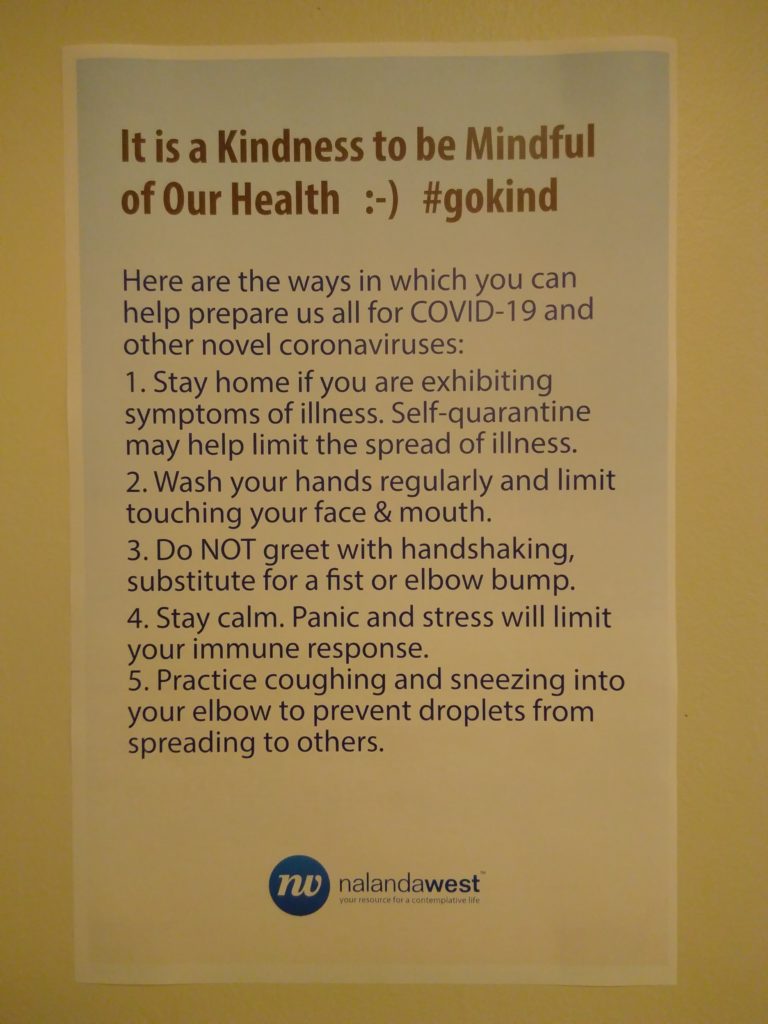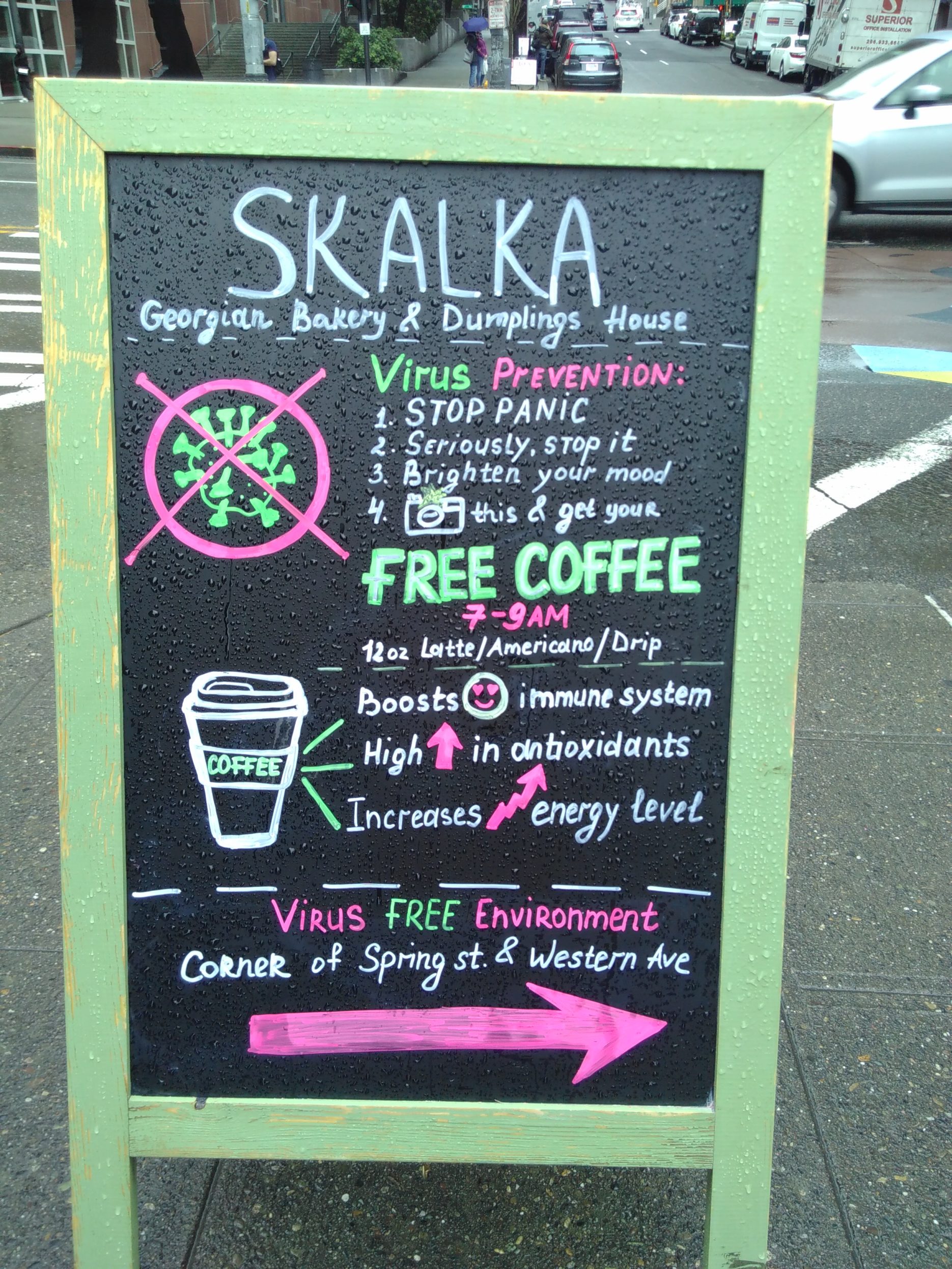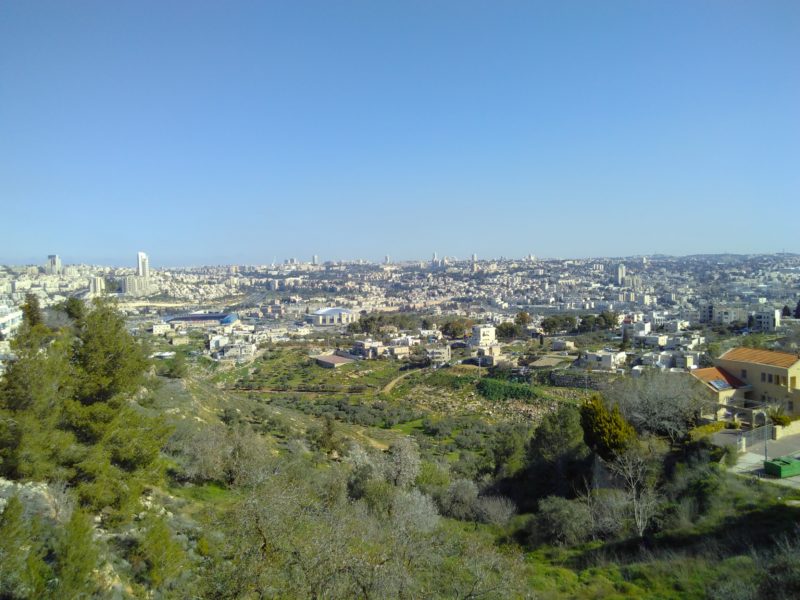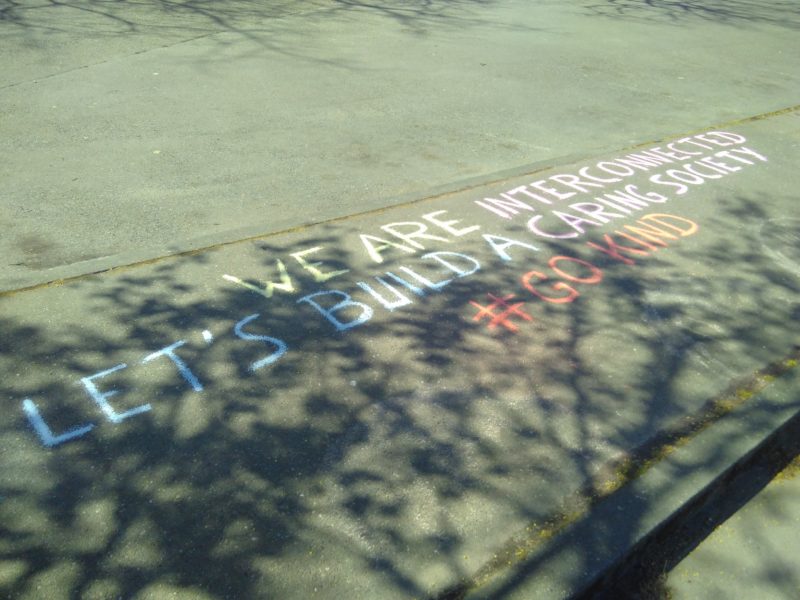Numbers referred to in the article below have changed dramatically since it was published and will continue to change as does our knowledge about Covid-19. Such changes will not affect the reasoning made, but it can be extremely helpful to be informed about the latest information. For example using this page of the WHO: https://www.who.int/emergencies/diseases/novel-coronavirus-2019]
How to stay calm, wise and kind?
As the new coronavirus is spreading, the anxiety rises. A Jerusalem-based psychologist, Michael Tobin, even speaks about ‘Corona-phobia’ and sees extreme panic all around him.1Source: https://www.jpost.com/HEALTH-SCIENCE/Is-the-world-suffering-from-Corona-phobia-619942 I observe in my own environment, currently Seattle (USA), that many people are worried & afraid. Reading the headlines of media around the world shows that similar feelings seem to take hold of people everywhere. Policies and rulings by all kinds of governments & organisations are partly driven by it and in some cases strengthen the anxiety experienced by many. Since anxiety and acting upon such feelings is usually harmful, I wonder, how to stay calm and (therefore?) wise & kind in such a situation?
This time it is the new coronavirus, Covid-19. But viruses are spreading every year and novel ones can also be expected in times that are yet to come. In a way the question is not how to stay calm in this specific situation. It is about how to stay calm in moments of uncertainty and insecurity in general.
There are at least two ways that can help all of us, myself included. It is not an easy task perhaps, but that does not make it impossible. One is an approach through the (rational) mind. The other through the heart. Depending on your personality, one of them might be most effective. You can choose yourself which one you want to read (first) and use as a tool. Though I have found them equally helpful myself.
The ground for wisdom & compassion
Before I continue, let me be clear: it is understandable that people are cautious and measures are taken to limit the spread of a virus (Covid-19 in this case). Certainly taking into consideration that it is different than the (long familiar) flu and has a relatively high death-rate. Whatever I write after this: We need to live up to experts and governors calling out for physical distancing, stay-at-home and whatever is necessary – for the benefit of all!
As I write this, my own mother informed me that someone is infected closer to her home in the province Fryslân (in the Netherlands). With herself having not the strongest immune system, it is helpful that she is aware of this, stays informed, and tries to prevent any unnecessary exposure to other people. But that does not mean she needs to worry, be afraid and anxious about the situation. In fact, we know that panic and stress limit our immune responses. It is, thus, even completely counterproductive! At the same time, a sense of fear & anxiety is also understandable. Recognizing the arising of such feelings is a first step towards calmness.
To be sure: Calmness is not being indifferent, naïve and / or careless. Quite the contrary: it is the ‘ground’ so to speak for wisdom & compassion. It helps if we gain knowledge about a spreading virus in this case, how to prevent infections and act on that. In addition, as I have written in another article, the new coronavirus shows how we strongly need wisdom & compassion in our world (see here:). People that are infected or even died, run a high risk, or being approached negatively (even racist) need our care. If you are among those infected (or otherwise directly affected) and reading this: I wish you receive such care and find some support in how to remain calm in what follows. So, having said this, we can discuss two approaches to strengthen a sense of calmness.

Calmness through reasoning
One way to prevent anxiety from arising, or what can serve as an antidote once it does, is reasoning. In this particular case I try to keep in mind the actual numbers. I am not sure whether my calculations are all precise. Also I am curious if anyone can refine my way of thinking here. But I do sense that knowing factual numbers can help us.
On March 7th, 2020, the World Health Organization reported that globally there are over 100.000 confirmed cases of Covid-19. With a world population of more than 7.7 billion people that means that for every 7.700.000 (7.7 million) there is one confirmed case. That seems a very low and maybe even insignificant number. Yet, we have to take an important fact into account: the nature of a virus is that it is trying to spread.
So, let’s continue with some numbers. Let’s say a person comes across about 200 people a day on average. Someone like my mother will come across way less, whereas others come across more. Though during a week we might come across the same people, we will also pass many new ones. It sounds a bit high to me, but let’s say we come across 1000 different people every week. Notice that I use the wording ‘come across’. That is different than actually greeting someone, which will be a much smaller number. Fifty? One hundred? Two hundred?
If one person is infected in every 7.7 million people, and I meet 1000 every week, the chances seem very low of me actually coming across – let alone greet – this person? Right? Again there is an important factor that I left out: concentration of people that are infected. In particular cities in China, South-Korea and Italy for example, the amount of infected people among those who I come across (and meet) will be significantly higher. The same goes for those visiting busy tourist sites across the world or attend all kinds of events where people gather in high numbers.
Yet, thinking about the factual numbers, I notice how my mind starts to relax. Even if we would triple the amount of cases, or make it tenfold or twentyfold, our risk seems very low to become infected. Which, again, is not to say that we should not be aware of what is going on and take different measures to prevent us from being infected. In fact, whether in a region with a high concentration of infected people or not, informing ourselves about what we can do to prevent this from happening and become a ‘spreader’ ourselves, and really follow those recommendations, is not only crucial. It is an act of kindness. Towards ourselves and others.

The point is: a virus spreading does not mean we have to become afraid and anxious. Even if becoming infected would eventually become almost inevitable, and this new coronavirus will continue to spread among many millions. As pandemics have done in the past. The chances increase rapidly when a particular number of affected people is reached. No doubt. Certainly in a world as interconnected as ours. Still then we can stay calm as well, but to show that would take us deeper into dealing with such emotions, the idea of a ‘self’ we are trying to protect and the reality of our world. For now I just wanted to focus on the current new coronavirus and some (factual) numbers.
Purely rational there is another oddity that I found and want to mention. Many people now act and do anything possible to prevent themselves to become infected. But if we look again at numbers, what it is people actually die from, we come across many things that can also be prevented by our own actions. Cardiovascular diseases & respiratory diseases are among the top-5 causes of death and for many that could have been prevented. Road injuries are in the top-10 list (in the USA the odds are 1 against 103), yet most of us have no problem stepping into a car. Though it is more likely to win an olympic gold medal or get hit by a meteorite, there are a lot of us afraid to fly.2Source: https://www.theodysseyonline.com/21-things-more-likely-than-dying-in-plane-crash Notice by the way we now have moved towards the causes of death, whereas in the chances above I discussed becoming infected. In any case, these numbers point to something about ourselves: we are not always rational. Put differently, the use of reasoning appears to be limited in power in certain moments. Which brings me to a second approach to develop more calmness: the heart.
Calmness in the heart
We can wonder in general about what emotions really are and why we should be afraid of anything at all. In fact, the current situation in the world might very well lead to such an exploration and it can be helpful to do this. However, for now, I take a very practical straightforward approach in relationship to a spreading virus, currently Covid-19. Earlier already I pointed to another approach when I wrote that we can start with accepting a sense of fear or anxiety when it arises.
Many things in our experience can contribute to a feeling of fear or anxiety. Whether it is a headline in the news, a story we read through social media or a conversation we have with someone. In Buddhism it is said that there a lot of causes & conditions combined for such a feeling to arise. Though this tradition holds that we can prevent it from arising, we can start with how to respond once it does. The crucial element in that process is our own mind. Which, in Buddhism, is the same as our heart. It even uses one word to describe both. In Tibetan for example thug.
Putting aside philosophical views about reality and our psyche for the purpose of this article, we all know we have the quality of loving-kindness and compassion within our ‘mind-heart’. So, once a feeling of fear or anxiety arises, we can ask ourselves: where is it coming from? How does it feel like? What thoughts are passing in such moments and does it help to believe them? This can be a start of exploring the actual experience. But the key is, as Dzogchen Ponlop Rinpoche put it in his book Emotional Rescue, to begin with a ‘mindful gap’. Not only can we then start to explore our experiences better. It also reduces the power already.
Besides a deeper exploration that can be of great benefit to us, in that gap we can also remind ourselves of this quality of loving-kindness & compassion. We can bring some acceptance to our experience and the situation as it is. Right now. Though this might not end the root of our fear, it does serve as a so-called antidote to it. It can function as an ‘armor’ so to speak. In other words, it might not bring about fearlessness entirely, but it will most certainly develop a sense of calmness.3Want to read more about this? See for example: https://www.lionsroar.com/fear-and-fearlessness-what-the-buddhists-teach/ Which, once more, is the very ‘ground’ or starting point if we want to live wisely and act kind towards ourselves and others.
No need to worry
Whether it is the more rational approach or through dealing with our feelings directly, I wish the contemplations above can be of benefit in dealing with the current situation. To strengthen a sense of calmness and, therefore, wisdom & compassion in all difficult situations. I would love to hear from you how you deal with the situation and what advise you have for others. Or perhaps you have questions or additional remarks about what I wrote. Feel free to contribute below with a response to this article.
In any case, I would like to end with words of the Buddhist master Shantideva that is often shared by the XIVth Dalai Lama in a more popular phrasing: “If a problem is fixable, there is no need to worry. If a problem is not fixable, there is no need to worry. Either way, there is no need to worry.” In other words: it is extremely helpful to do everything we need to stay safe, healthy and care for everyone in need. The new coronavirus might require some extreme measures to do so by working from home, limiting our travels, going online with learning courses and so on. But we only harm ourselves and others if we add fear & anxiety to this. This article is, therefore, maybe a longer version of an advise often given through popular images on social media. With an addition inspired by the Skalka-café in Seattle: keep clam and relax. Seriously!




